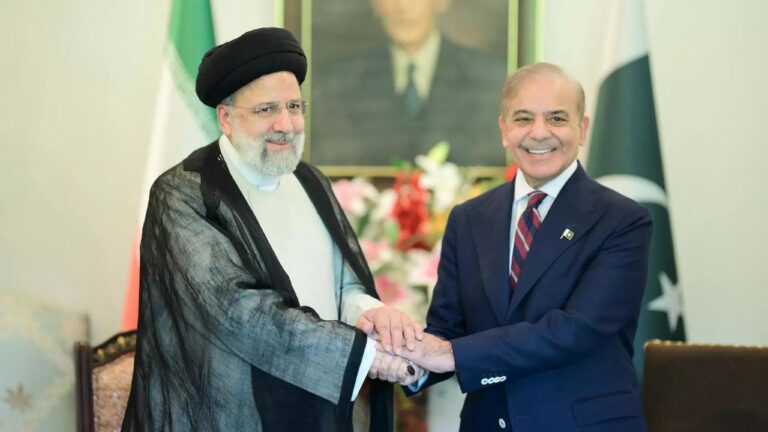ISLAMABAD: Iranian President Ebrahim Raisi announced at a joint press conference with Pakistani Prime Minister Shehbaz Sharif in Islamabad on Monday that the two countries had resolved to increase trade to $10 billion, adding that the current level was “not acceptable.” I can’t.”
Raisi’s three-day visit is the first by a foreign leader since Pakistan’s controversial Feb. 8 general elections. This comes against the backdrop of Iran’s recent attack on Israel with more than 300 drones and missiles. The visit is attracting attention as tensions with Israel continue and US sanctions remain in place.
“We are working on strengthening ties at a high level. We have decided to strengthen economic, commercial and cultural ties between Pakistan and Iran,” Raisi said.
Sharif expressed a similar opinion. “Despite the challenges we face, we must keep this relationship strong,” he said, praising Iran’s firm stance on the humanitarian situation in Gaza and calling for an immediate cessation of hostilities.
Pakistan and Iran share a 900-kilometre border, which is at risk of illegal border crossings, smuggling and infiltration by armed groups. Both countries have accused each other of failing to prevent terrorist groups from taking shelter within their territories and carrying out attacks across their borders.
In January last year, Iran launched a missile attack on a hideout of anti-Iranian extremists in Pakistan’s southwestern Baluchistan province, and Islamabad retaliated with attacks on anti-Pakistan extremist strongholds operating within Iranian territory. The exchange of strikes raised concerns about larger-scale conflict and regional instability.
The Iranian president will be accompanied by his spouse, foreign minister, ministers and business representatives.
Analysts said Raisi’s visit would also address financial and legal issues related to the construction of a gas pipeline between the two countries. Despite signing a deal in June 2009 for a pipeline to export Iranian natural gas to Pakistan, Iran’s energy sector faces sanctions over its nuclear program, likely due to US pressure. Construction on the Pakistani side has not started. Iran’s attack on Israel further complicates Pakistan’s pipeline construction efforts.
Raisi’s three-day visit is the first by a foreign leader since Pakistan’s controversial Feb. 8 general elections. This comes against the backdrop of Iran’s recent attack on Israel with more than 300 drones and missiles. The visit is attracting attention as tensions with Israel continue and US sanctions remain in place.
“We are working on strengthening ties at a high level. We have decided to strengthen economic, commercial and cultural ties between Pakistan and Iran,” Raisi said.
Sharif expressed a similar opinion. “Despite the challenges we face, we must keep this relationship strong,” he said, praising Iran’s firm stance on the humanitarian situation in Gaza and calling for an immediate cessation of hostilities.
Pakistan and Iran share a 900-kilometre border, which is at risk of illegal border crossings, smuggling and infiltration by armed groups. Both countries have accused each other of failing to prevent terrorist groups from taking shelter within their territories and carrying out attacks across their borders.
In January last year, Iran launched a missile attack on a hideout of anti-Iranian extremists in Pakistan’s southwestern Baluchistan province, and Islamabad retaliated with attacks on anti-Pakistan extremist strongholds operating within Iranian territory. The exchange of strikes raised concerns about larger-scale conflict and regional instability.
The Iranian president will be accompanied by his spouse, foreign minister, ministers and business representatives.
Expanding

